“A Car Went Into Lost Lake …”
In which I unravel a local mystery–and reveal some drawbacks with the passive voice
“On March 21 around 11 p.m., a car went into Lost Lake,” started the story in the Snohomish County Tribune, my local paper.
Now I’ll admit, it’s not the most exciting line ever to start a news story, but it did fire my imagination.
The sheer banality of the phrasing got me thinking “there’s got to be more here.” And maybe there is …
“A car went into Lost Lake” … but how? Did it roll in from one of the houses that surrounded the lake? Still, “A car rolled into Lost Lake” is no more interesting, is it?
So then, did it drive in? Well, “it” didn’t drive in, someone drove it in, and just knowing that would have yielded us “a person drove their car into Lost Lake.” Still, ho hum.
Our bland opener is helped along by this intriguing modifier: “ultimately submerging.” Of course it submerged—cars in lakes tend to do that. But why “ultimately”? Does the unnamed reporter know something about this car as it “went” into the lake—that it didn’t sink directly to the bottom, perhaps, but floated on the surface for a time, “ultimately submerging”? Or is this just a red herring, a random word thrown in by a writer with the same flair for language that chose “went”? Is this writer sitting on a dark mystery that we are being asked to untangle … or is he just a local journalist on a tight deadline, grateful for the press release put out by the fire department?
Because the slate is so blank, I create a story in my head: A car hurtles down Lost Lake Road, the driver not realizing he’s driven onto a Department of Fish and Wildlife access road until he crests the hill and plummets downward straight for the lake … but by then it’s too late, and he’s going so fast that he shoots off the bank and out into the lake, the car’s momentum carrying him forward until he glides to a stop, the car rocking back and forth on the surface for just a moment before “ultimately submerging.” There I go, reading in a few details that the story left out! But that’s the glory of the passive voice, isn’t it? It leaves the door open.
If only I could ask someone who had seen what happened, a witness, say. And sure enough, there is a witness:
A witness nearby in a canoe saw a man swim his way out.
I was ready for a “nearby resident heard a splash”—after all, the lake is ringed with houses very near the access point—but I didn’t expect a witness nearby in a canoe at 11:00 at night! My god, how beautiful—how exotic!
Here’s how I picture it: A married woman, distraught after yet another fight with her husband, flees her house and paddles her canoe quietly out into the lake to clear her head. But the silence is broken when, down at the public access, a speeding car careens down the hill and hurtles into the water, skimming out to the center of the lake before submerging. As the car sinks, a man thrashes to the surface, calls “Help,” and starts to swim to the shore. The woman paddles over, tells the man to grab onto the gunwales, and leads him the last few yards to the shore, where he straggles out and sits down, exhausted. The witness calls 911–and waits for the authorities to arrive.
How about you? What would you do with this “witness nearby in a canoe”?
Of course, all we really know is that a witness “saw a man swim his way out.” Perhaps the man has clues to offer about his dramatic (or utterly boring) visit to the lake? Here’s what he reported:
The man told authorities that his mother and father were trapped in the car, so divers were sent in, said a Snohomish Regional Fire & Rescue press release.
Holy cow! One minute we have a distraught woman rescuing a man from a sunken car, the next minute we’ve got a full blown Chappaquiddick on our hands, albeit buried under those passive constructions “were trapped” and “were sent in.”
The man’s parents were trapped in the car! (I’m not making this one up, though the man may be.) Was this a murder-suicide that the driver chickened out on, or purely an accident, a product of a missed turn on a poorly marked road? If only we knew more about the man’s behavior: did he dive down again and again to rescue his parents, only to exhaust himself in the cold and the dark? Or did he swim confidently to the shore, knowing that his parents are already gone, knowing that all he can do now is stick to his story and wait for events to play out? We know so little!
I try to picture the scene once the divers arrive: our midnight canoer, who is likely the one who called in the incident, stands off to the side while the drenched man stands talking to two “authorities,” likely young firefighters, who have come out to the scene in their aid car. Are the lights flashing at this point, or are they off? Are the police at the scene? Is the man wrapped in a blanket? Has this consternation drawn a curious knot of onlooking neighbors? And are they standing at the end of the road looking out into the dark lake, wondering, like I am, what’s happened to the mother and father?
I can’t help but see this from the divers’ perspective too. Surely they had counted the time elapsed—car sinks, man escapes, canoer calls 911, firefighters arrive, man tells firefighters of trapped parents, firefighters call divers, divers drive to the scene (and from some distance, I have to believe; Lost Lake isn’t named Lost Lake because it’s centrally located), divers launch their boat—and then concluded, as I have, that the poor missing parents are stone cold dead.
Picture a small crowd of people—man, witness, firefighters, neighbors—standing at the water’s edge, watching the lights from the divers going down into the water and coming back up, watching the light from the boat play across the surface, waiting for the divers to return to shore. Then check back in with the news story:
The divers did not find evidence anyone else was in the car.
There was no one in the car!
And just like that our odd little tragedy gets really weird. What must it have been like for the divers to find no one? Surely they searched the area around the car, to see if the parents had gotten clear of the car. Surely they checked the trunk, in case the parents were captive there, either drowned or already dead when the ride into the lake started. The divers searched in and around the car and found NO ONE, then they came back to the shore.
Imagine the realization that there were no parents in the car as it dawned on the crowd at the bank: Is the man, the driver, surprised? What does he say to the divers, the firefighters? Does he continue with his delusion, perhaps his hallucination, that his parents are trapped, or does he fess up at this point that it’s all been a joke, a mistake? Are the divers angry at him, or have they been at this job long enough to just shake their head in wonderment at the things people will do.
I could imagine a hundred different scenarios, but all we get from our reporter is this:
The man who surfaced was taken to a local hospital. Sheriff’s deputies interviewed him and believe the man was the only occupant in the car that went into the lake. —Tribune staff
I get that the man (the one who surfaced!) was taken to the local hospital: he was probably pretty cold after swimming in a cold lake on a cold night in March. He may have been drunk or high or in some way out of his mind. But how was he taken to the hospital? Was he taken by the Sheriff’s deputies, because he was suspected of a crime? Or did the deputies catch up with him at the hospital and only then hear the story that made them believe there were never parents in the car after all?
And the deputies: how did they take this whole turn of events? Did they attempt to locate the parents, to call them? How did that go? Did the parents patiently explain that “the man” often drives his car into lakes, but they’re perfectly fine and they’ll swing on by the hospital to drive the man home?
And did the man, now warmed up after a few hours in the hospital, walk out into the cool predawn air a free man, hailing a ride back to wherever he had begun this wild adventure? Or was he in police custody, charged with driving under the influence and falsely reporting a crime, among other charges? We’ll never know (unless some intrepid reporter digs deeper into what really happened).
All I know is this: this quiet little community I live in may hide a world of strangeness just beneath the surface. And also this: vague, imprecise language leaves open a world of possibilities.
Here’s a little background on this story, if you’re interested:
Lost Lake is a small lake that lies between Woodinville and Monroe, so small that no power boats are allowed. It’s surrounded by houses. The Fish and Wildlife access point isn’t a boat launch so much as a public access point where people can put in a canoe or kayak, or fish from the shore. (See map below.)
Lost Lake Road leads northwest directly toward Lost Lake, with just a few signs to indicate that the road has become an access road for the Department of Fish and Wildlife access point. The steep access road leads directly down to the lake. If you were new to the area, driving in the dark, you could easily continue straight down Lost Lake Road, onto the access road, and into the lake. (I went and checked this out to confirm.)
The local fire department, known as Snohomish Regional Fire & Rescue, issued a press release on the incident: https://www.srfr.org/public_information/current_news/documents/3.22.2022_srfr_water_rescue_at_lost_lake_nid93955.pdf
The local newspaper, the Tribune, is published weekly and is available by subscription or for free at a variety of locations. It’s the kind of paper that reports on city politics, school bond measures, new principals being named at schools, 3-on-3 basketball tournaments, etc. A local nursery owner writes a gardening column. There’s a police blotter and the same cranky people have been writing letters to the editor for 20 years. Fully half the paper is typically given over to legal notices. Still, I read the paper regularly and I’m grateful for the work of the editor, Michael Whitney, and glad to have this paper. If nothing else, it fires my imagination.



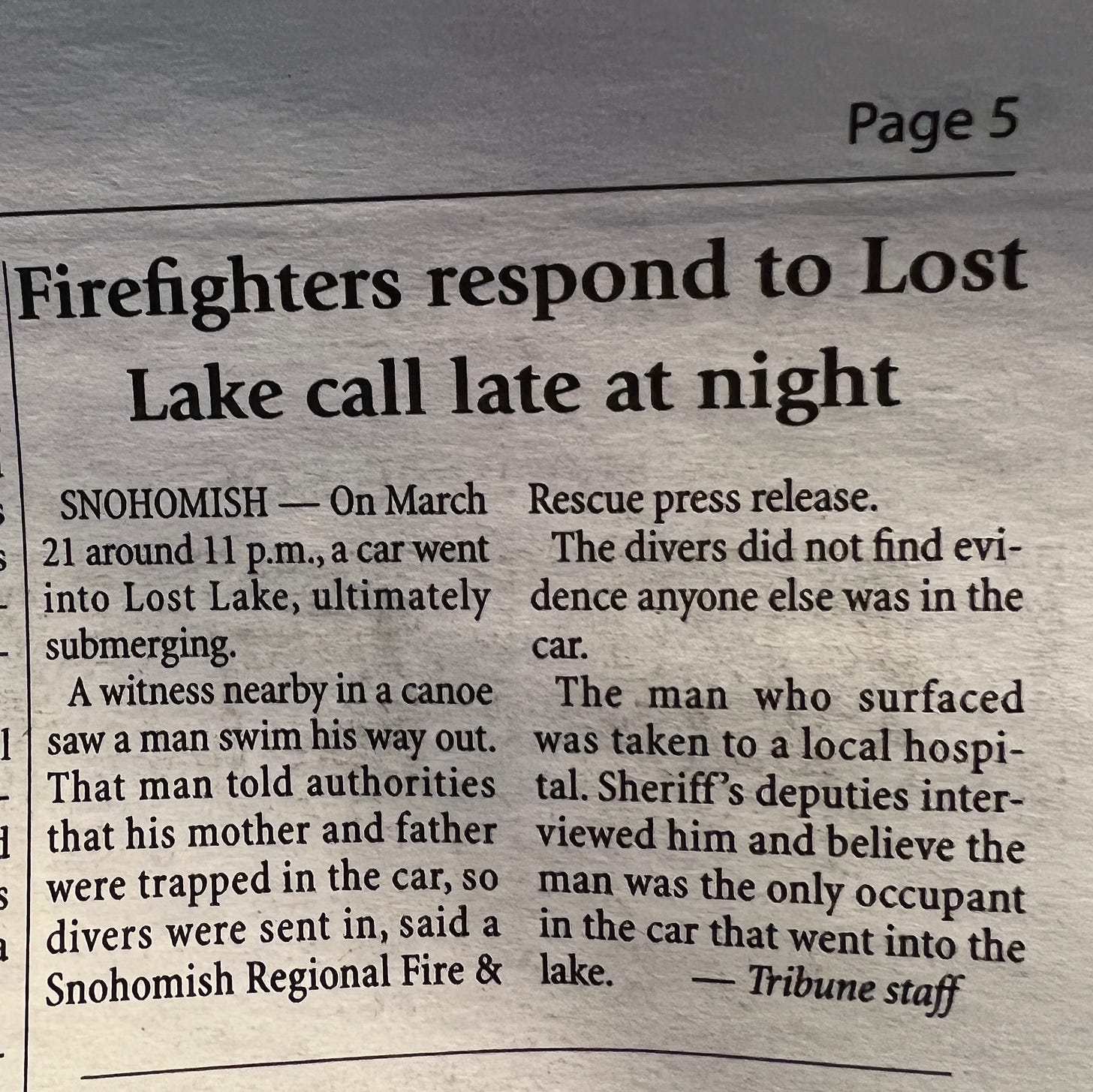
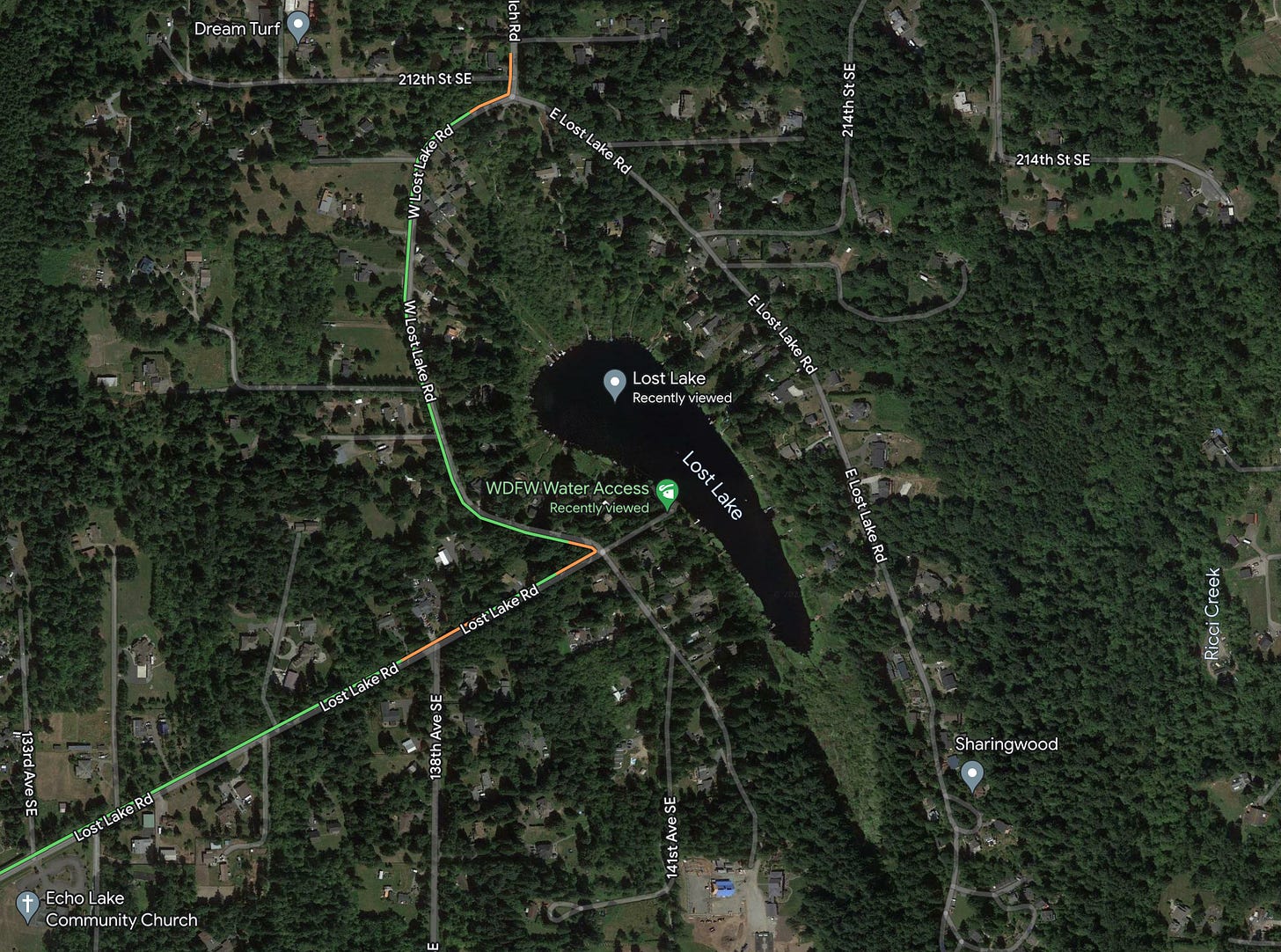
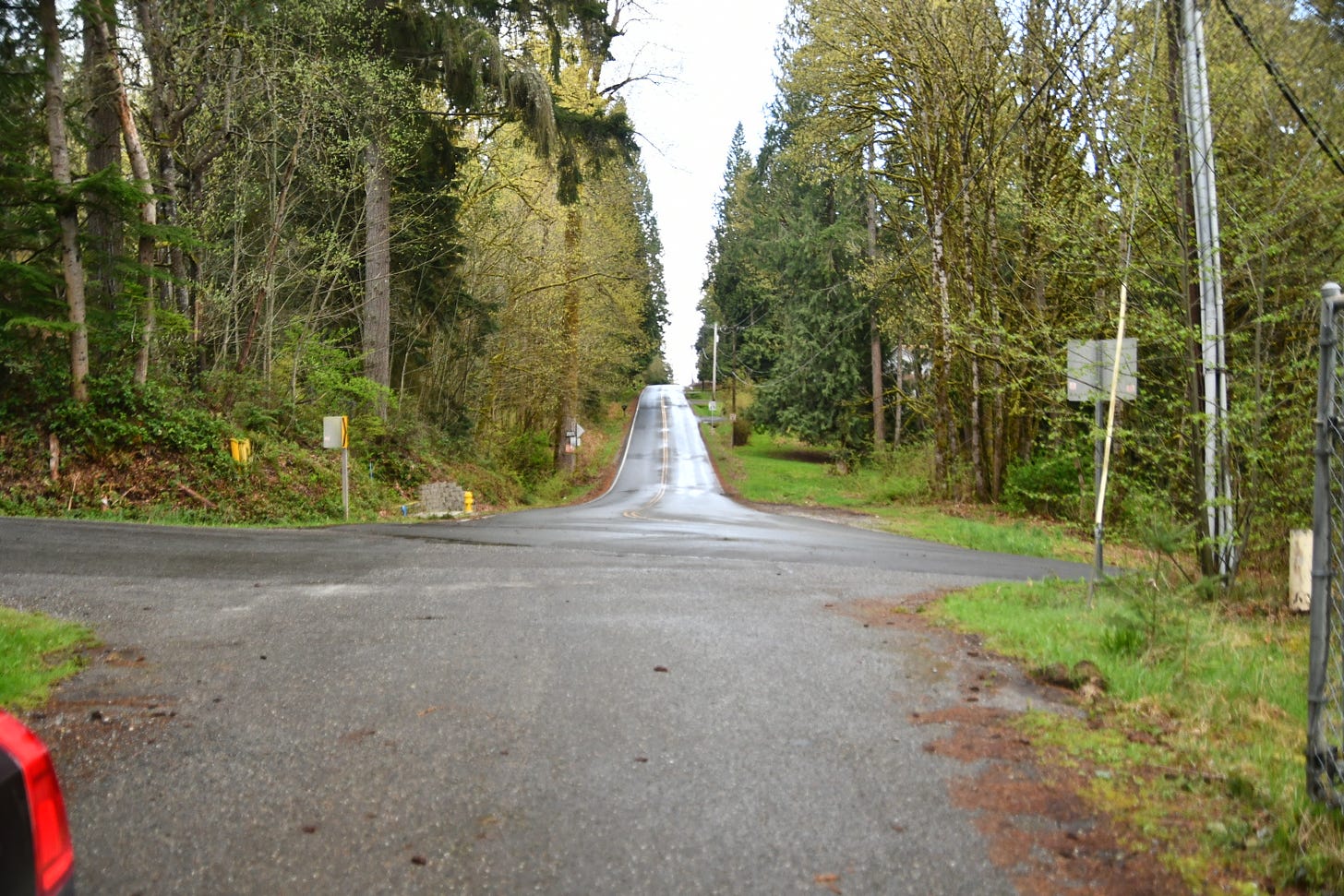
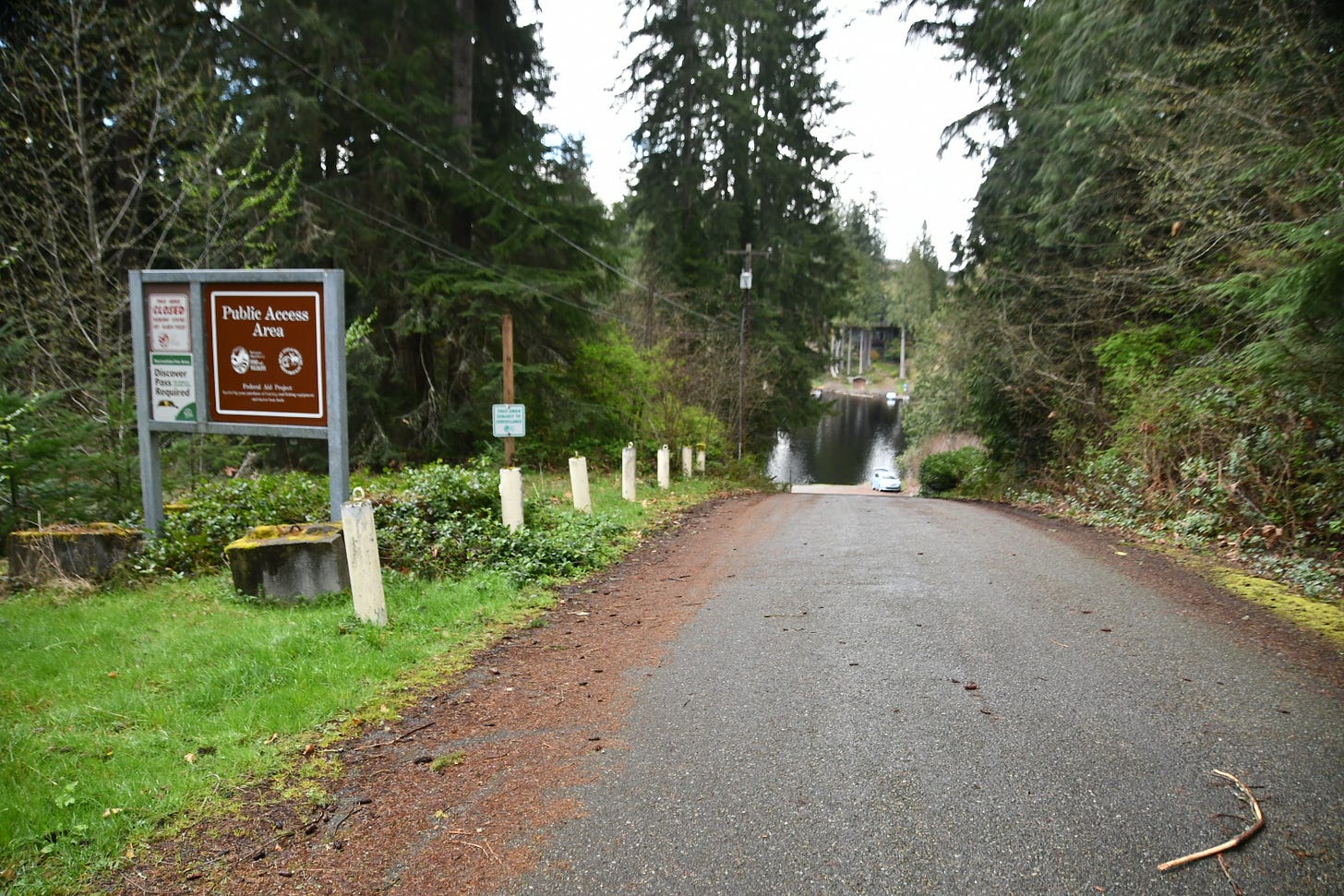
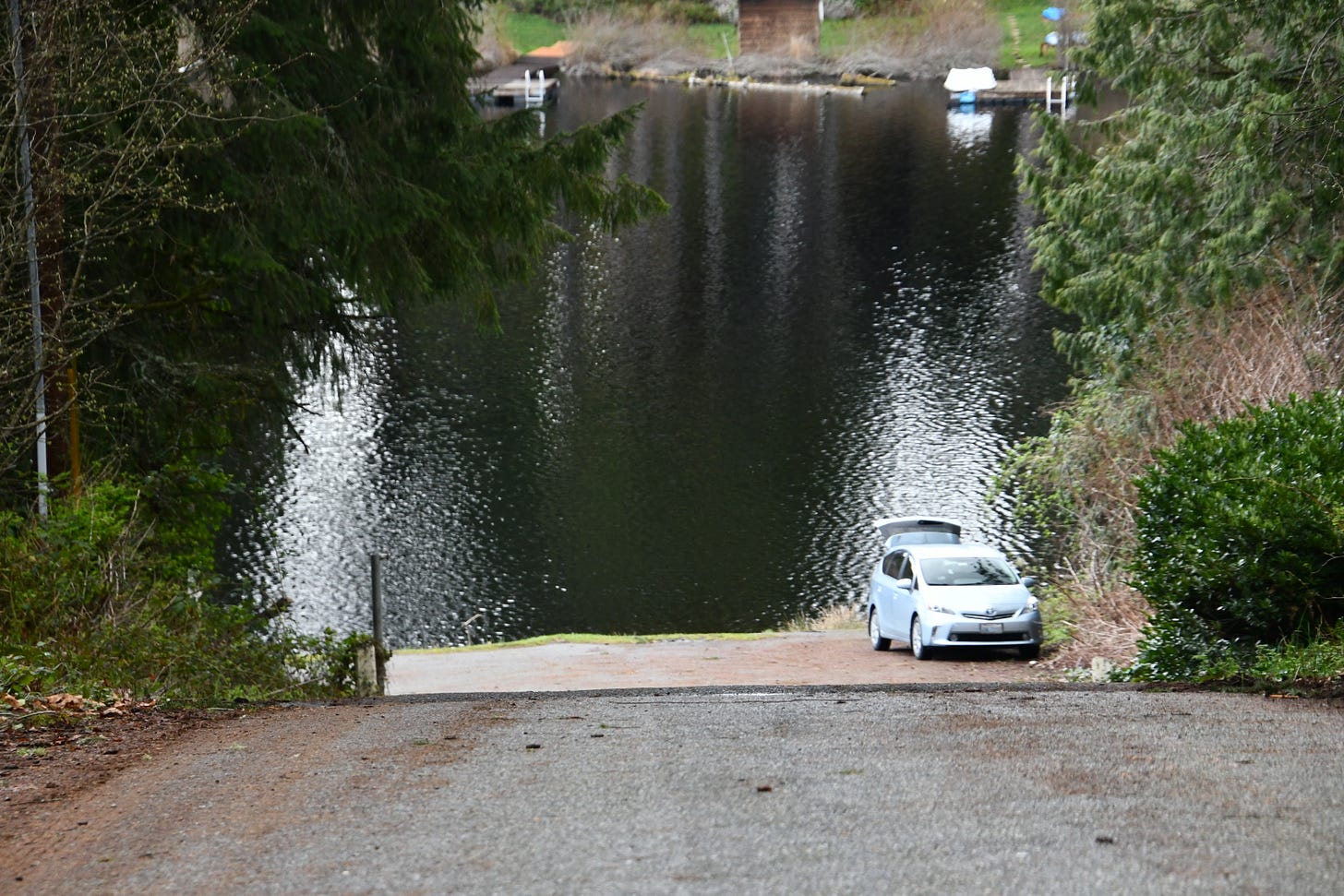
Might have to kayak this one.
I find it amazing how different the story could be if someone with actual writing talent wrote it.